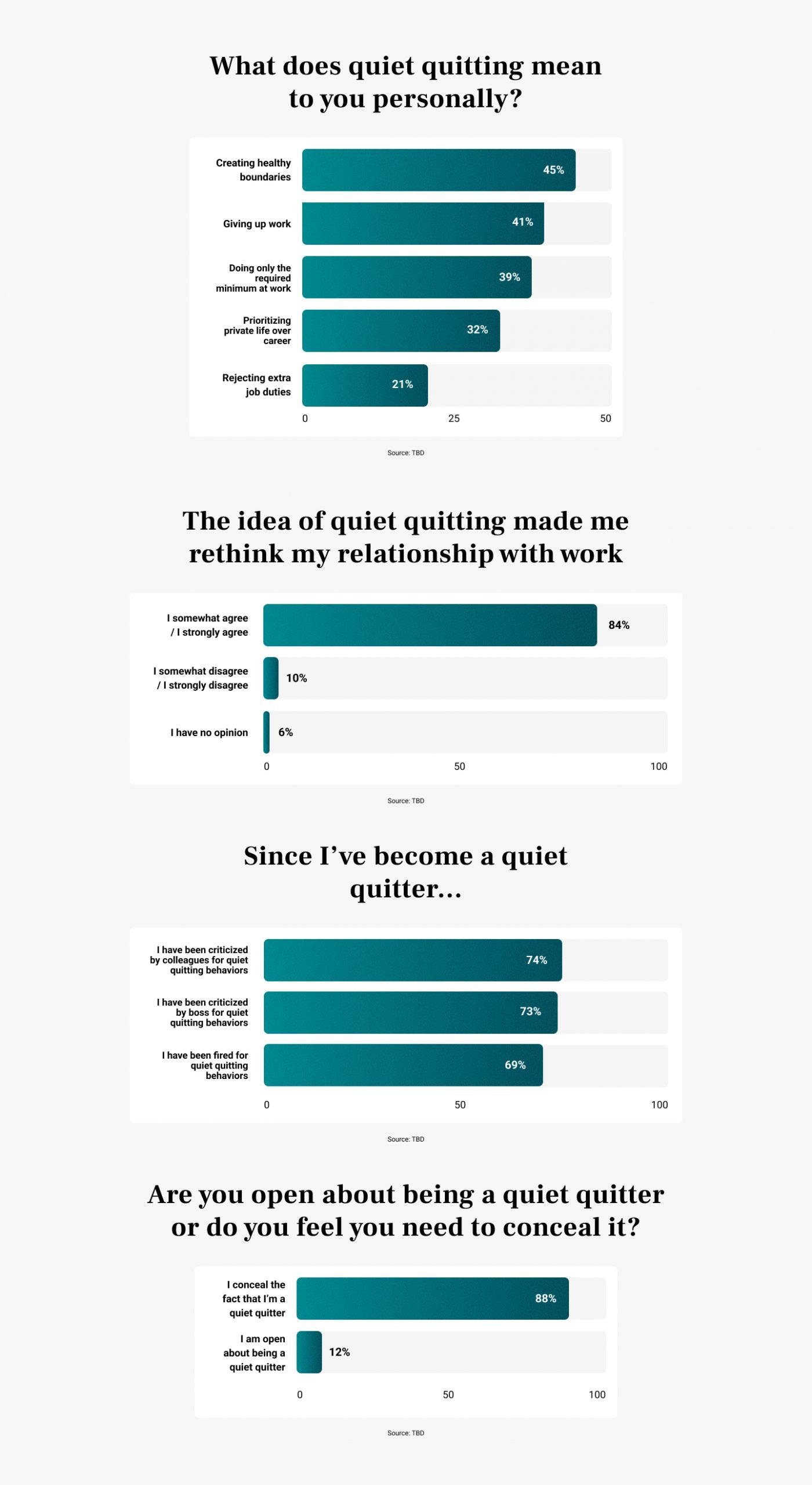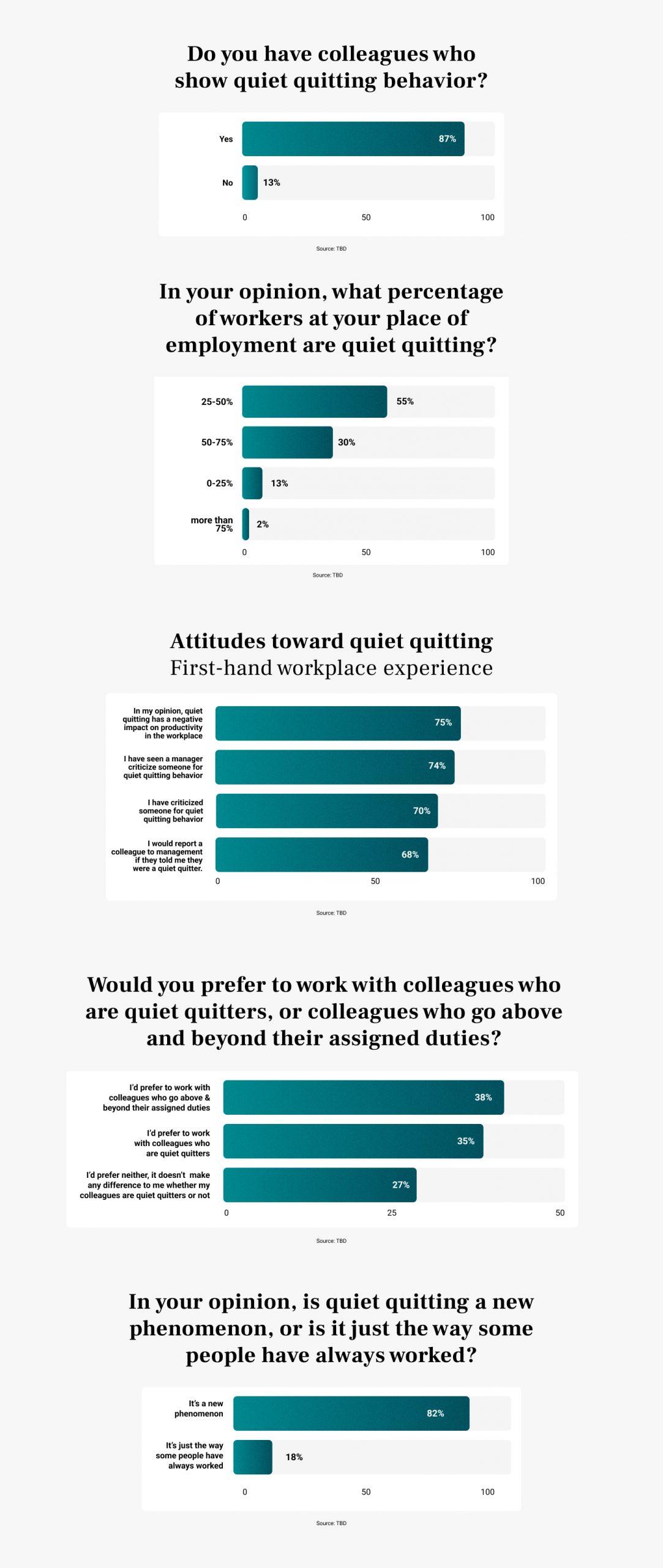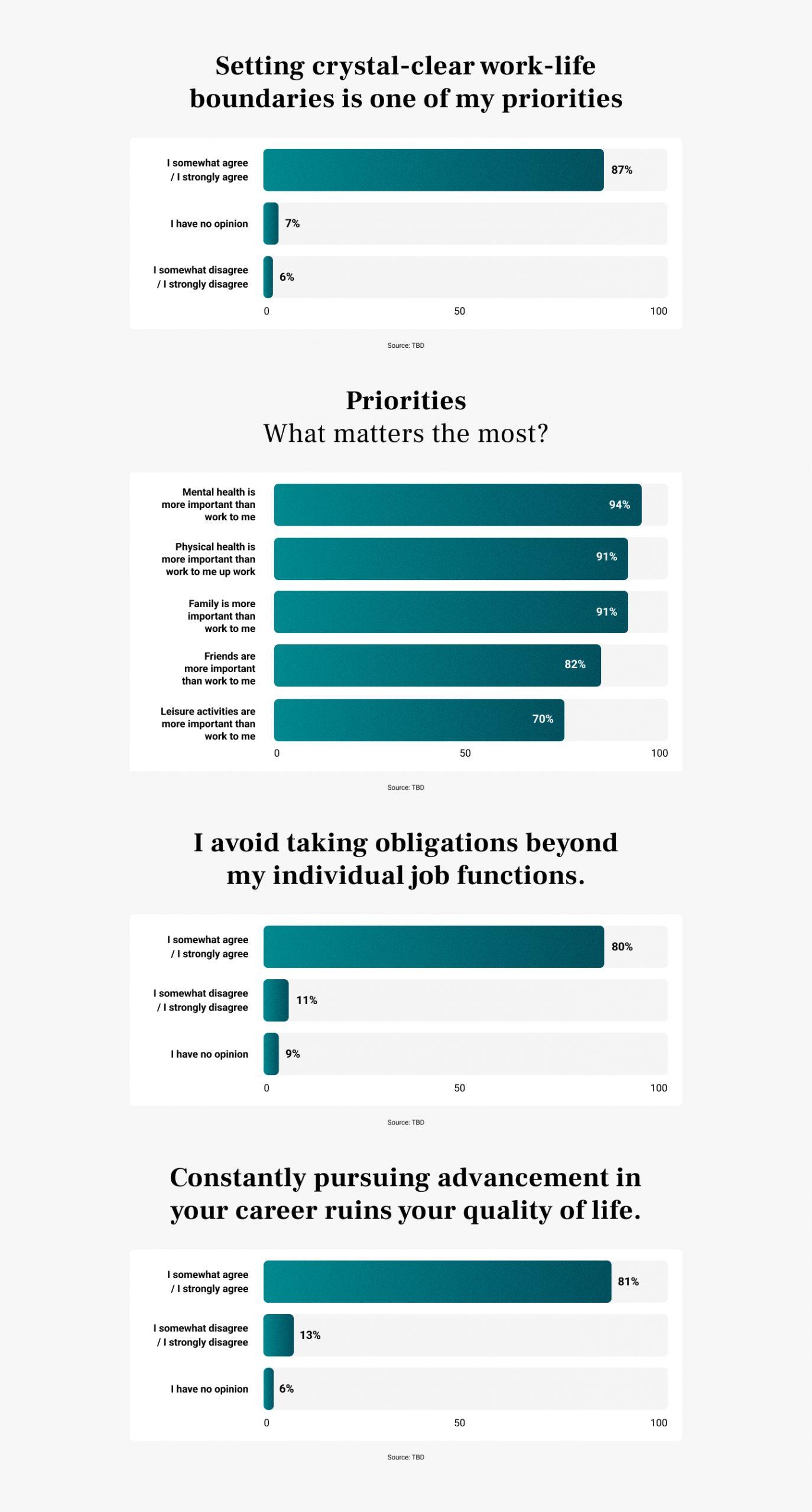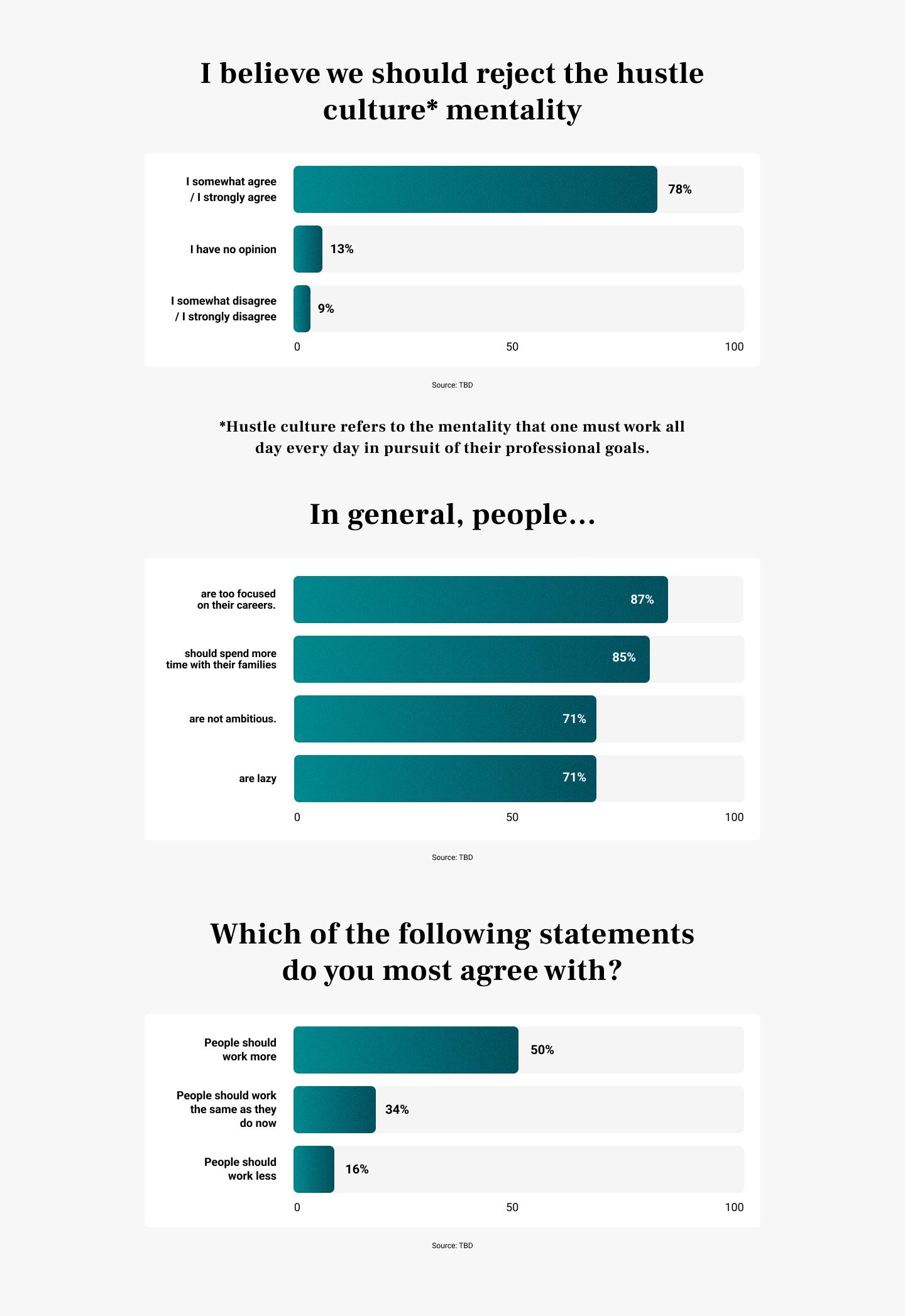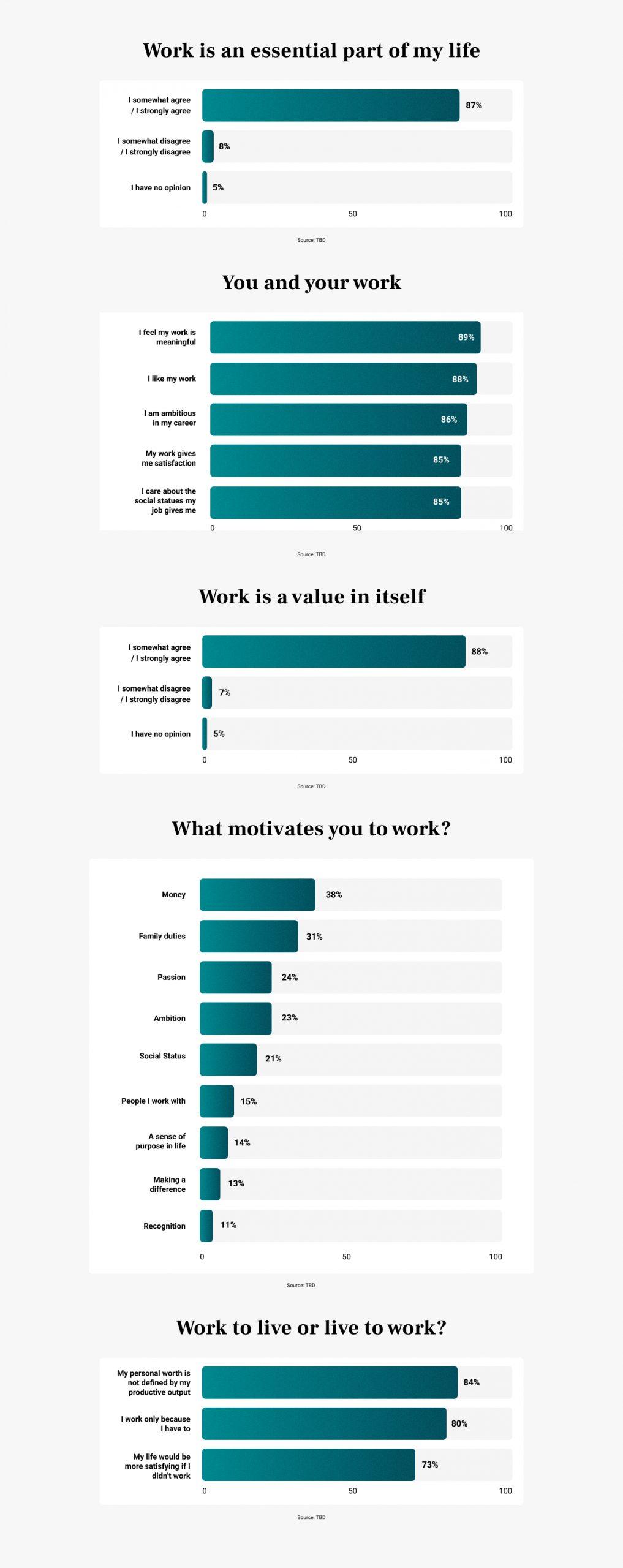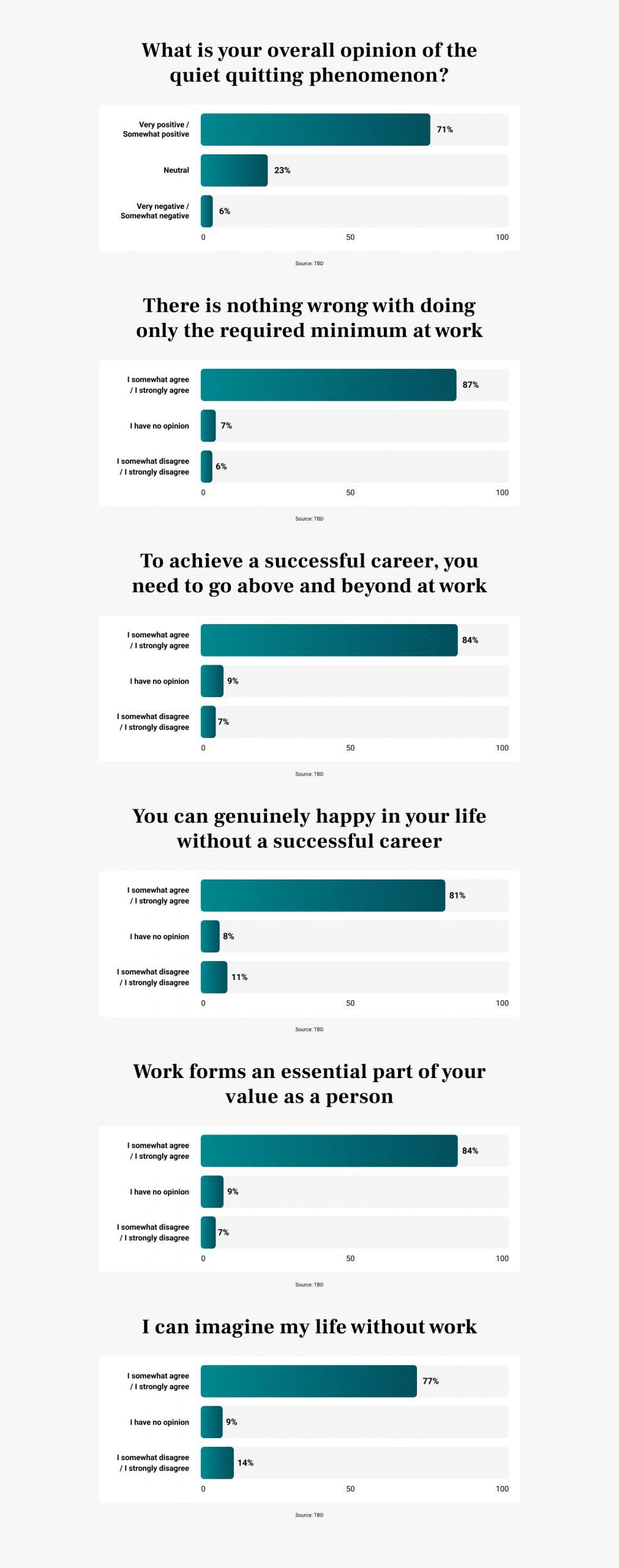Making Noise for Quiet Quitting | 2022 Study
Quiet quitting refers to doing only the bare minimum at work without going above and beyond, often due to dissatisfaction or lack of engagement.
A phenomenon amplified by social media and Gen Z, quiet quitting has elicited serious debate among workers and employers.
At LiveCareer, we wanted to get to the bottom of quiet quitting to determine if it is, in fact, real or just another buzzword that’s gone viral. We surveyed over 1,000 employees to investigate opinions on quiet quitting. Let’s discover what our study revealed about:
- Scale of the phenomenon in question.
- Consequences of becoming a quiet quitter.
- Perceptions of quiet quitters as colleagues.
- Role of work-life balance and setting boundaries.
- Going above and beyond at work vs. doing only the required minimum.
What is quiet quitting?
Quiet quitting refers to doing the minimum requirements of one’s job and putting in no more time, effort, or enthusiasm than absolutely necessary. As such, it is something of a misnomer, since the worker doesn’t actually leave their position and continues to collect a salary.
–Investopedia
Quiet quitting is a broad term that includes:
- Quitting the idea of going above and beyond at work.
- No longer subscribing to the hustle culture mentality.
- Emotional detachment from work.
As you can see, quiet quitting is a concerning issue. Both labor market trends may be linked to a noticeable fall in job satisfaction influenced by the COVID-19 pandemic.
Let’s move on to the research and find out what LiveCareer’s study revealed on this burning issue.
Quiet quitting in practice
Our study found that quiet quitters come from all ages and races, genders, life paths, educational backgrounds, and industries. The highest percentage of respondents viewing themselves as quiet quitters were those working in business and finance. Conversely, the smallest group of quiet quitters were survey-takers with work experience of over 11 years.
A Gallup survey from June 2022 shows that quiet quitters “make up at least 50% of the U.S. workforce — probably more.” Our study, conducted four months later, leaves no doubt that the trend in question is growing.
Our survey was conducted anonymously. With this anonymity, respondents were free to speak their minds.
We asked, “Are you open about being a quiet quitter, or do you need to conceal it?” Almost 9 in 10 (88%) respondents concealed the fact that they were quiet quitters. The percentage is even higher regarding respondents employed in business and finance (94%). At the same time, 12% of the surveyed claimed they were open about being a quiet quitter.
We also wanted to investigate how our respondents defined quiet quitting. The results were as follows:
- Creating healthy boundaries: 45%
- Giving up work: 41%
- Doing only the required minimum at work: 39%
- Prioritizing private life over career: 32%
- Rejecting extra job duties: 21%
We also asked the survey takers if quiet quitting had made them rethink their relationship with work. More than 8 in 10 (84%) respondents agreed. Still, there were some disparities in answers given by people from different demographic groups. It turns out that the concept of quiet quitting has a greater influence on some than on others.
We asked the survey takers if quiet quitting a job had made them rethink their relationship with work. Here’s what we discovered:
- Company’s size: 501+ employees — 76% vs. 1-50 employees — 85%
- Annual personal income: less $25,000 — 80% vs. $75 000 and greater — 88%
- Form of work: remote — 80% vs. onsite — 87%
- Race: ethnic minorities — 78% vs. white — 85%
- Age: 25 or younger — 80% vs. 41+ — 86%
These statistics highlight the nuanced impact of quiet quitting across different demographics. Employees in smaller companies and higher income brackets show a greater tendency to rethink their work relationships, possibly due to closer-knit environments and a desire for work-life balance.
Onsite workers and older employees also report higher rates of reconsidering their relationship with work, likely influenced by their structured work schedules and evolving career priorities.
Ethnic minorities and younger workers, facing unique workplace challenges and expressing a desire for career exploration, demonstrate significant engagement shifts. Understanding these differences is key for employers seeking to address the root causes of disengagement.
What to do if you find yourself quiet quitting
If you relate to any of these statistics, you might already be quiet quitting and not even know it.
Many workers are merely experiencing burnout and finding it difficult to engage at work genuinely.
If you think you’re quiet quitting work, here are some steps you can take to feel fulfilled by what you do.
1. Talk to your boss.
We know it’s not an easy conversation to start, but approaching your manager to discuss where you’re struggling is the first step to overcoming feeling disengaged at work.
There’s no need to broach the topic by saying, “Hey, boss, I’m thinking about quiet quitting,” but mention that you’ve noticed a change in your motivation. A good boss will understand you’re human and won’t show up at your 100% daily. However, if you agree that your performance hasn’t been consistent, your boss should help you develop a plan to get back on track.
Pivoting to a new project, taking tasks off your to-do list, enrolling in special training to spark your creativity and motivation, or even taking a well-deserved break are all excellent ways to curb the feeling of quiet quitting that your supervisor should support and guide you through.
2. Realign your workload.
Many employees settle into quiet quitting because their workload is too much. Suppose that’s the case, and you consistently slack and neglect duties without being proactive about solving that issue. In that case, your supervisor will inevitably have to correct it, and the worst-case scenario would be getting fired.
However, another less predictable reason many workers begin quiet quitting is because of a too-light workload.
Although having a nearly empty to-do list might seem like a dream, for many workers, this reality leads to feeling purposeless and useless at work, which can significantly affect a person’s mental health and lead them to quiet quitting.
Whether you feel too busy or not, your workload is one of the first things you can try to change to avoid “quiet quitting.” Talk to your team or manager to find ways to distribute tasks more evenly so you don’t feel overworked or underutilized.
3. Consider finding a new role.
If you’ve already exhausted every option at your current workplace to avoid quiet quitting to no avail, it might be time to find a new job.
Changing jobs is a long process, but we promise you that you can find a role where you can thrive. Start by browsing open positions in your desired profession or industry. Save a few jobs that stand out to you.
Once you’ve identified a few roles you’re interested in, update your resume with a Resume Builder or write a resume from scratch if it’s been a while or you’re switching careers.
A strong resume will help you land interviews, and before you know it, you’ll be starting your first day at a job that will inspire you and transform your entire life. If you need help visualizing a good resume, check out our resume examples library, where you’ll find resume samples for any job.
Working with quiet quitters
How does it feel to work with quiet quitters? Our research participants shared their first-hand experiences.
- 87% of respondents have colleagues who show quiet quitting behavior.
- 70% of survey takers claimed they had criticized someone for quiet quitting behavior. It applied mainly to 82% of people working in small companies (1-50 employees). On the contrary, criticizing quiet quitters was less common (60%) among respondents from big companies (501 employees or more).
- 74% of survey takers had seen a manager criticize someone for quiet quitting behavior. The highest percentage of positive answers (85%) came from people with an annual personal income of $ 25,000 or less.
- Almost half (49%) of respondents with the greatest work experience (11 years or more) declared they hadn’t criticized their colleagues for quiet quitting behaviors. This group of survey takers was also least likely (47%) to report a colleague to management if they were a quiet quitter.
- But overall, 68% of all respondents declared they’d report quiet quitting to the boss.
- According to 75% of the survey respondents, quiet quitting a job negatively impacts workplace productivity. Employees from the business and finance industry (86%) were even more in favor of that opinion, while the percentage dropped to 70% in the software/IT sector.
Moving forward, we investigated who our respondents preferred to work with: quiet quitters or the opposite. The answers were as follows:
- I’d prefer to work with colleagues who go above and beyond their assigned duties: 38%.
- I prefer neither; it doesn’t matter whether my colleagues are quiet quitters or not: 27%.
Could the 38% who want hustle culture colleagues wish to others to carry their quiet quitting? That’s up for discussion.
Finally, 82% of research participants considered quiet quitting as a new phenomenon, while 18% believed it was just the way people have always worked.
Telltale signs an employee is quiet quitting
Quiet quitting in employees can go undetected for months and sometimes years, but an attentive manager can spot this behavior in employees because of these telltale signs:
Decreased productivity
One of the most obvious signs someone is quiet quitting is that their productivity has significantly decreased. If an employee is no longer meeting productivity quotas or is constantly missing deadlines, a conversation about work expectations and a plan to improve is needed.
Lack of initiative
Strong workers want to improve their skills and grow within their roles and beyond. If employees are no longer pitching ideas or taking on additional projects to succeed in their careers, they might be throwing in the towel at their jobs.
Minimal communication
Another way employers can tell a worker is quiet quitting is because that individual isn’t communicating well with others, sometimes at all. If an employee has spent weeks without touching base with their supervisor, isn’t attending meetings, or shows up to every virtual meeting with their microphone and camera turned off, likely, this employee is completely disengaged from their work.
Increased absenteeism
If an employee takes constant sick days, shows up late for work, or leaves early regularly, this worker might have fallen into a quiet quitting pattern.
However, managers should be careful when approaching this subject. A worker exhibiting constant absenteeism might face a serious medical or difficult personal situation. Employers should initiate the conversation from a place of concern rather than immediate accusations of quiet quitting.
Indifference to feedback
It’s easy to spot a worker who’s a quiet quitter when it’s time for performance reviews and feedback sessions. If employees show themselves indifferent to negative or positive feedback, they’re more than likely over their job and are content with coasting for as long as possible.
Reduced collaboration
One of the most harmful effects of quiet quitting is a blow to team morale. A team won’t be able to thrive if there’s a quiet quitter in the midst. If workers resist collaboration, they might quiet quit to avoid a larger workload.
Supporting employees who are struggling
Now that you can spot the signs of quiet quitting employees, here’s what you can do to support struggling workers.
- Foster open communication.Workers who have decided to quiet quit are essentially employees who have expressed concerns about an unfair work environment or unrealistic productivity expectations. Employers must be proactive about rebuilding trust and fostering better communication with their teams if an employee is constantly shut down when attempting to express these struggles.
- Recognize and reward efforts.Even the best employees can become quiet quitters if their employer neglects their efforts. It’s just as important for a worker to meet goals as for an employer to recognize team members’ efforts. Workers who have gone above and beyond might deserve an award, bonus or raise. Employees who are seen and appreciated rarely resort to quiet quitting.
- Conduct stay interviews.Don’t wait for an employee to quit; interview them about their reasons for leaving. Conduct stay interviews to be proactive in preventing a high turnover rate and learn to spot potential quiet quitters. Interview current employees about what motivates them to stay with the company and what the employer can do better to keep workers engaged.
- Offer professional development.The expectation of continued growth is a significant factor in workers staying with a company. If employers want to encourage workers to see a job as more than doing the bare minimum in exchange for a salary, they must also go above the bare minimum. Apart from giving workers a good wage, they should offer opportunities for employees to learn new skills and explore different branches of the business. This type of initiative can send potential quiet quitters on a more fulfilling career path.
- Provide mental health support.Although quiet quitting is problematic and unethical, the discourse can become an unfair vilification of struggling employees. Unfortunately, most quiet quitting behaviors arise from a highly stressful work environment. Suppose employers want to put a stop to this quiet quitting trend. In that case, they should offer resources that promote mental health, such as counseling services, stress management programs, and even monetary benefits for employees to use for therapy.
- Promote work-life balanceThe best way to avoid quiet quitting in the workplace is to foster an environment where a balance between work and personal life is encouraged and supported. Offer flexible working hours and remote work options, and ensure employees take their allotted leave. Overworked employees are more likely to disengage and choose quiet quitting.
The role of work-life balance
For many, perhaps erroneously, work-life balance is one of the core motivators of quiet quitting. We asked participants a series of questions on combining career with personal life.
- Almost 9 in 10 (87%) respondents viewed setting crystal-clear work-life boundaries as one of their priorities. It was essential for employees in the manufacturing (94%) and business and finance (92%) industries.
Let’s focus on priorities now. Respondents were also asked what mattered more to them. Their answers were the following:
- Mental health is more important than work to me: 94%
- Physical health is more important than work to me: 91%
- Family is more important than work to me: 91%
- Friends are more important than work to me: 82%
- Leisure activities are more important than work to me: 70%
Digging deeper:
- 99% of the health care industry employees value mental health more than work.
- Attitudes toward family and friends seemed to change with respondents’ age. Participants aged 25 or younger claimed family (84%) and friends (76%) were more important than work. Regarding older respondents (aged 41 or more), the percentage rose to 93% in the case of prioritizing family over career and 84% in the case of friends.
- Survey takers of ethnic minorities (85%) valued leisure activities more than white respondents (70%) did.
Notably, 8 in 10 respondents said they avoided obligations beyond their job functions. This may result from the fact that the vast majority (81%) of our research participants believed that constantly pursuing career advancement ruined their quality of life.
Being career-focused isn’t a negative quality. After all, growing as a professional, developing new resume skills, and being rewarded for those efforts are critical components to feeling happy with your work and yourself.
Views on today’s workplace culture
It’s time to rethink work culture. When constantly being busy is glorified, getting caught in the hype is as easy as forgetting what matters most. Let’s examine the research findings.
- Quiet quitting a job is a rebellion against hustle culture. Almost 8 in 10 (78%) respondents believed we should reject the hustle culture mentality.
Hustle culture refers to the mentality that one must work all day, every day, to pursue their professional goals. Work can dominate time so unnaturally that we have no time to live our lives.
- Research participants generally viewed people as too focused on their careers (87%). 85% also believed we should spend more time with our families.
50% of respondents believed that people should work more, 16% said they should work less, and 34% said they should work the same as now.
Our relationship with work
Moving on, we asked questions to examine how important work was in the participants’ lives and how it made them feel.
- 87% of respondents declared work an essential part of their lives. This was especially true for 96% of employees in the manufacturing industry and 95% of respondents with an annual income of less than $25,000.
- 88% of the surveyed considered their work meaningful, 88% liked their job, and 85% found it satisfying.
- Work mainly satisfied employees of the business and finance (92%) and health care (91%) industries.
- 85% of respondents claimed they cared about the social status their job gave them. Social status is significant to 94% of people employed in the manufacturing sector.
- 86% of survey takers claimed they were ambitious in their careers.
- Almost 9 in 10 (88%) participants agreed that work was a value in itself.
Our respondents declared that their main motivations were the following:
- Money: 38%
- Family duties: 31%
- Passion: 24%
- Ambition: 23%
- Social status: 21%
- People I work with: 15%
- A sense of purpose in life: 14%
- Making a difference: 13%
- Recognition: 11%
Some other research findings to note:
- 84% of respondents agreed that their productive output didn’t define their worth.
- 80% of participants declared they worked only because they had to. The percentage of positive answers was even higher for the business and finance (88%) and the health care (86%) industries.
- For 73% of survey takers, their lives would be more satisfying if they didn’t work. Yet, 31% of people with the most significant work experience (11 years or more) strongly disagreed.
Although sometimes conflicting, these findings show that many workers are dissatisfied with their work, workplace dynamics, and lack of work-life balance.
Quiet quitting is a knee-jerk reaction to feeling powerless to change that. After all, most workers can’t afford the luxury of quitting a job, which makes them unhappy without another job lined up or some sort of security blanket to fall on.
How to find a job you love
If you’re currently experiencing a lack of work-life balance that makes you want to quit, it’s time to kickstart your job search.
Exiting your current role is a monumental task without a clear game plan. But that’s why we’re here to help!
Understand your passions and interests.
The first thing you need to do is find a job that makes you happy and focuses on your passion. Consider the activities you like and the skills you excel at, and take career assessments to align your job search to those parameters. Once you’ve got a clearer idea of what you want from your day-to-day, tailor your job search for jobs that match what you want.
Find the right job.
If only we could find our dream job on the first search result after browsing a job board! It’s no secret that finding a job that fits you takes a bit of effort, but it’s possible if we exhaust all the resources available.
The most essential item in your job search to-do list is to write a resume uniquely tailored to your desired jobs. Leverage your professional network to find job opportunities; attend networking events, ask colleagues for referrals and connect with people in your industry via LinkedIn.
When narrowing down the jobs you want to interview for, assess the company culture and ask questions about their values and work-life balance. They may not suit you if they don’t give you a satisfactory answer.
Choose a career you’re passionate about.
Because work is a big part of our lives, the benefits of doing something you’re passionate about can do wonders for your overall well-being.
A few things you can expect from a brand new job aligned with your values and interests are:
- Increased motivation and engagement.
- Enhanced creativity and innovation.
- Better resilience when facing challenges at work.
- Career longevity; no more aimless job hopping.
- Continuous learning and skill growth.
- Positive impact on your well-being and mental health.
- Meaningful relationships with coworkers, sometimes beyond the workplace.
A career you are passionate about boosts your professional success and enhances your overall happiness and well-being. Don’t settle for a dull, quiet, quitting existence; find a job to help you flourish.
Ready to get started? Check out our resume examples if you already have a job in mind, or explore building a standout resume with our Resume Builder.
Going above and beyond at work
As many as 85% of respondents claimed to work more than is “officially” required by their job role. There were some interesting disparities within different demographic groups to note. Have a look:
- Company’s size: 501+ employees — 76% vs. 1-50 employees — 94%.
- Industry: Software/IT — 81% vs. white — business & finance — 92%.
- Race: ethnic minorities — 94% vs. white — 84%.
We also asked research participants what they did outside working hours and how often. Here’s what they answered:
- Checking work emails: 46%
- Picking up work phone: 54%
- Working: 85%
The top 3 groups of respondents working more than required were:
- Employees of the business & finance industry: 93%
- Employees in the manufacturing industry: 91%
- Employees of the health care industry: 90%
To get a bigger picture, we asked the research participants to tell us approximately how much time they spent outside official working hours per week. Here’s what we discovered.
- 1-3 hours: 11%
- 4-5 hours: 38%
- 6-8 hours: 45%
- 9 hours or more:6%
Let’s dig deeper to understand better. What makes so many of us work so much? Check out the answers to the questions below.
“Why do you personally work more than required?”
- Because of money: 27%
- Because of my ambition: 21%
- My life situation forces me to work more than required: 18%
- Because of a chance of promotion: 16%
- I am afraid of losing a job: 10%
- I don’t feel lonely when I work: 9%
- Other: 2%
When workers love what they do, are passionate and feel like they’re making a difference, going above and beyond at work is not only justified but routine.
Although quiet quitting can seem alluring, there is so much more satisfaction in working at something that fulfills you personally. We spend most of our time at work, so why not try our hardest to ensure that work is a great place to be?
Final opinions on quiet quitting and related issues
Quiet quitting evokes strong emotions and turns out to be a surprisingly polarizing term. We asked a few final questions to examine our respondents’ opinions on this labor market trend and co-related issues. Let’s have a look at the research findings.
- 71% of the surveyed perceived the quiet quitting phenomenon as positive. Interestingly, respondents aged 25 or younger (75%) were more optimistic about it than those aged 41 and above (68%). The older, the wiser? Or somewhat more skeptical toward another revolutionary trend?
- Almost 9 in 10 (87%) respondents agreed there is nothing wrong with doing only the required minimum at work. Additionally, employees of health care (94%) and business and finance (93%) industries favored such an attitude even more. Interestingly, the company’s size also mattered. 89% of respondents from small companies (1-50 employees) didn’t see anything wrong with doing the bare minimum at work. At the same time, 80% of those working for big companies (501 employees or more) shared that view.
- As many as 84% of survey takers thought work was essential to your value. At the same time, 77% of respondents could imagine living without a job. Yet, the percentage drops to 68% for employees with more than 11 years of work experience.
We also focused on the relationship between a successful career, the effort you need to achieve it, and a happy life.
- 84% of the survey takers believed going above and beyond at work was necessary to achieve a successful career. At the same time, 81% said you could be genuinely happy without a successful career.
Quiet quitting is a more complex topic. Although we, as career experts, don’t support the idea of quiet quitting, we know how we approach work needs to change. Employees should speak up for themselves if they’re unhappy at work. Talk with your manager, share your concerns, and ask for opportunities to explore other projects or areas of work that interest you and motivate you.
Quiet quitting harms both employers and employees. If you’re unhappy or mistreated at work, quiet quitting is not a long-term solution to true happiness.
Although having a successful career may not be the key to happiness, a positive and balanced work experience will positively impact your mental health and give you the time and resources to nurture the aspects of life that make you happy, however that looks for you.
Key takeaways
Let’s sum up what LiveCareer’s study on quiet quitting revealed.
- 94% of respondents considered themselves quiet quitters.
- 87% of participants viewed setting crystal-clear work-life boundaries as one of their priorities.
- The vast majority of survey takers valued mental health (94%), physical health (91%), and family (91%) higher than work.
- Overall, 87% of respondents viewed people as too focused on their careers . 85% also believed we should spend more time with our families.
- For 73% of survey takers, their life would be more satisfying if they didn’t work.
- 85% of respondents spent approximately 6–8 hours per week working outside “official” time.
- 71% of the surveyed perceived the quiet quitting phenomenon as positive.
- 84% of the survey takers believed that going above and beyond at work was a must to achieve a successful career. At the same time, 81% declared that you could be genuinely happy without a successful career.
FAQ
What is quiet quitting a job?
Quiet quitting a job refers to a new and increasingly popular practice some job seekers do when dissatisfied with their jobs. Quiet quitting a job means doing the absolute bare minimum at work and refusing to participate in other initiatives at work.
What is the quiet quitting technique?
The quiet quitting technique involves minimal effort at work to avoid termination, such as stretching tasks, arriving late, leaving early, skipping meetings and avoiding extra duties. It’s a strategy to remain under the radar while doing the bare minimum.
What is the actual term for quiet quitting?
Quit quitting refers to a worker quietly refusing to excel at work but doing enough to stay employed. Despite being a catchy new phrase, many career experts affirm this behavior has always existed.
What is the root cause of quiet quitting?
The root cause of quiet quitting among workers is mainly dissatisfaction with their current job, whether due to an overload of work, a high-stress environment, or a professionally unfulfilling job. The individual worker’s and the manager’s responsibility is to avoid quiet quitting behaviors.
Methodology
The above-presented findings were obtained by surveying 1059 respondents online via a bespoke polling tool. They were asked questions about a wide range of aspects that quiet quitting covers (i.a. hustle culture, the importance of work-life balance, the role of work in one’s life, and more). These included yes/no questions, scale-based questions relating to levels of agreement with a statement, questions that permitted the selection of multiple options from a list of potential answers, and a question that allowed open responses. All respondents included in the study passed an attention-check question.
Limitations
The data presented relies on self-reports from a randomized group of respondents. Each person who took our survey read and responded to each question without any research administration or interference. There are many potential issues with self-reported data like selective memory, exaggeration, attribution, or telescoping. Some questions and responses have been rephrased or condensed for clarity and ease of understanding for readers.
Fair use statement
Want to share the findings of our research? Go ahead. Feel free to use our images and information wherever you wish. Just link back to this page, please—it will let other readers get deeper into the topic. Additionally, remember to use this content exclusively for non-commercial purposes.
Sources
- Daughtery, G., “What Is Quiet Quitting—and Is It a Real Trend?”
- Espada, M., “Employees Say ‘Quiet Quitting’ Is Just Setting Boundaries. Companies Fear Long-Term Effects”
- Hussain, Z., “Explained: Quiet Quitting, Trend That Rejects The Hustle Culture Mentality”
- Harter, J., “Is Quiet Quitting Real?”
- Klotz, A. C. & Mark C. Bolino, M. C., “When Quiet Quitting Is Worse Than the Real Thing”
- McGregor, G., “Before ‘Quiet Quitting’ in the U.S., There Was ‘Lying Flat’ in China. How the Anti-work Movement Swept he World’s Two Largest Economies”
- Tapper, J., “Quiet Quitting: Why Doing The Bare Minimum At Work Has Gone Global”
- Travis, B., “Quiet Quitting: What It Really Means and How to Address It”



